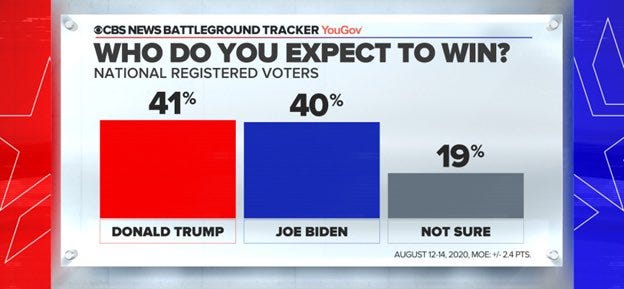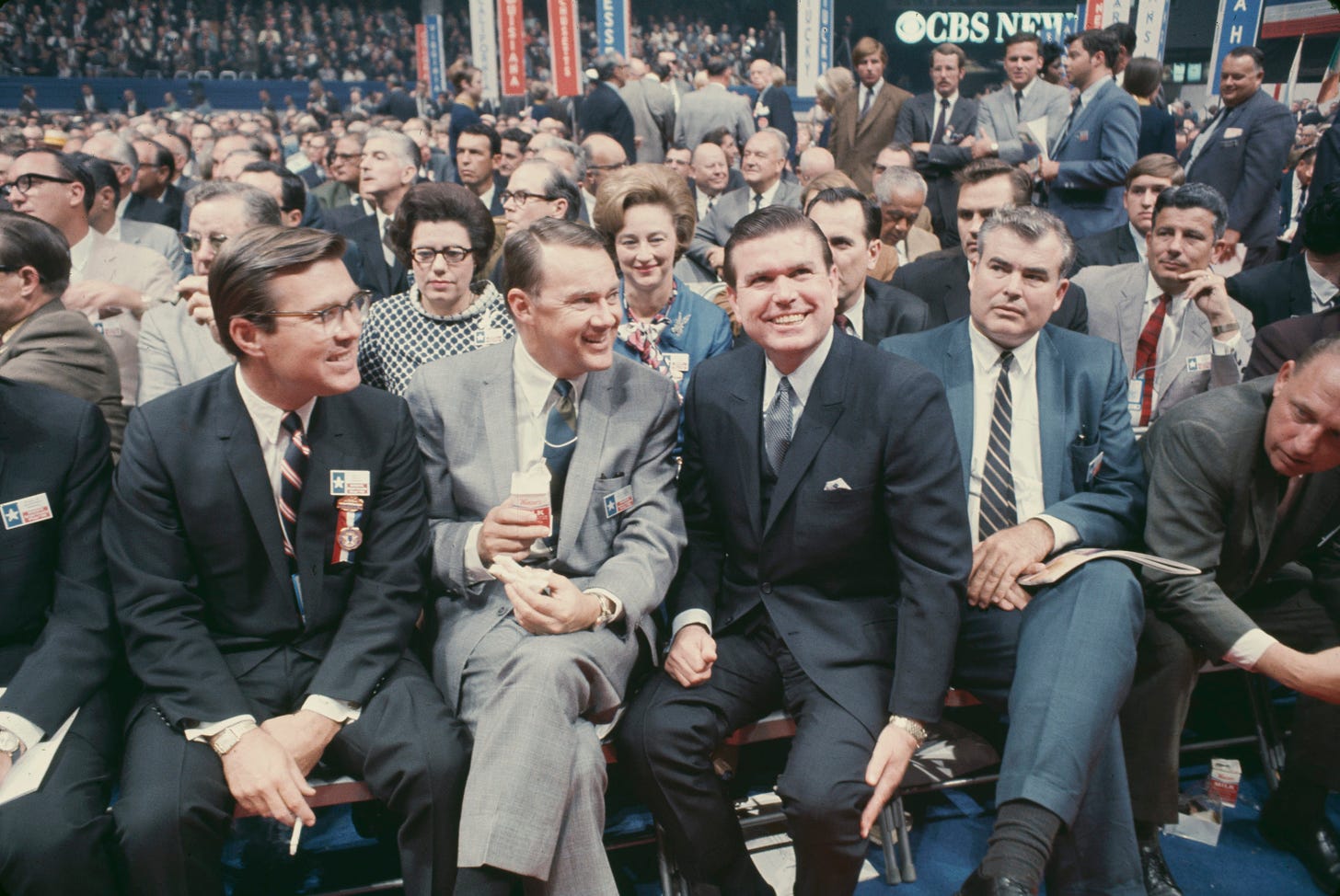"There is something about a national convention," H. L. Mencken wrote in 1924, "that makes it as fascinating as a revival or a hanging."
"It is vulgar, it is ugly, it is stupid, it is tedious, it is hard upon both the higher cerebral centers and the gluteus maximus, and yet it is somehow charming. One sits through long sessions wishing all the delegates and alternates were dead and in hell—and then suddenly there comes a show so gaudy and hilarious, so melodramatic and obscene, so unimaginably exhilarating and preposterous that one lives a gorgeous year in an hour."
No one will describe the Democratic convention that opens today in Milwaukee that way. Instead, we get a "ghost convention."
Welcome to the Daily Countdown. We have 78 days to go until the election; and then 78 days after that until Inauguration Day.
It's odd, really, that the convention will be held in my hometown and that I won't be going. But then, pretty much no one else will either. And, I have to say, that's kind of sad. Milwaukee would have put on a pretty good party. Instead, there will be no beer-soaked parties, no funny hats, and I'll probably spend the week at home, watching snippets on my laptop.
Frankly, I have no idea what it's going to look like, or if anyone will pay attention to anything but the major speeches.
Of course, it's been heading this way for years. The conventions have devolved from the gaudy show of Mencken's experience to made-for-television pep rallies, to tightly scripted infomercials. So, this seems likely the inevitable outcome: a virtual convention that barely exists outside of its live stream.
The non-conventions of 2020 may mark the final dissolution of the anachronistic political burlesque shows, and the conventional wisdom will be that it's about damn time. Which is too bad, because they used to be something.
The 1924 Democratic convention that Mencken sweated through took 103 ballots and 16 days to pick John W. Davis; the 1940 Republican convention improbably propelled Wendell Willkie to the presidential nomination; and there was the shambolic 1972 Democratic convention that left nominee George McGovern delivering his acceptance speech in the middle of the night. The 1980 Republican convention that nominated Ronald Reagan was convulsed by speculation that he might name former president Gerald Ford as his running mate (he chose George H.W. Bush instead). Barack Obama's speech at the 2004 Democratic convention made him a national figure.
And, of course, there was the 1968 Democratic convention in Chicago, complete with a police riot, which I remember particularly well, because I was there.
My father was a delegate. I was a page. And I stole the Wisconsin delegation's banner.
My father had been Eugene McCarthy's Wisconsin campaign director in 1968. A newspaper reporter once described him as having a “Runyonesque quality," a description that obviously delighted him.
Short, dark browed, puckish faced, he looks like the sort who might let you in confidentially through billing cigar smoke, on a sure winner in the fifth race.
The real Jay Sykes is a tough-minded idealist, who took his share of gambles in McCarthy's Wisconsin Odyssey but knew what the odds were from the beginning. "That's why I went into it," he says with his wry grin. "I liked the odds. They were so prohibitive."
Here's a picture from the floor of the convention. From left in the foreground are Wisconsin delegation chairman Donald Peterson, Louis Hansen, and my dad.
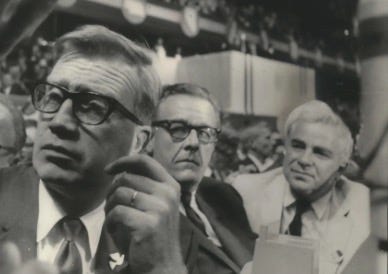
Afterward, he described the apocalyptic confrontation in Chicago as "akin to a Rotary club luncheon in the middle of World War I."
"It wasn't even disillusioning," he says, "just disgusting and demeaning." With the outcome preordained, he said, "it was just a matter of going through a symbolic act, the playing out of a drama." He'd really had enough of conventions. In his papers, I found this clipping:
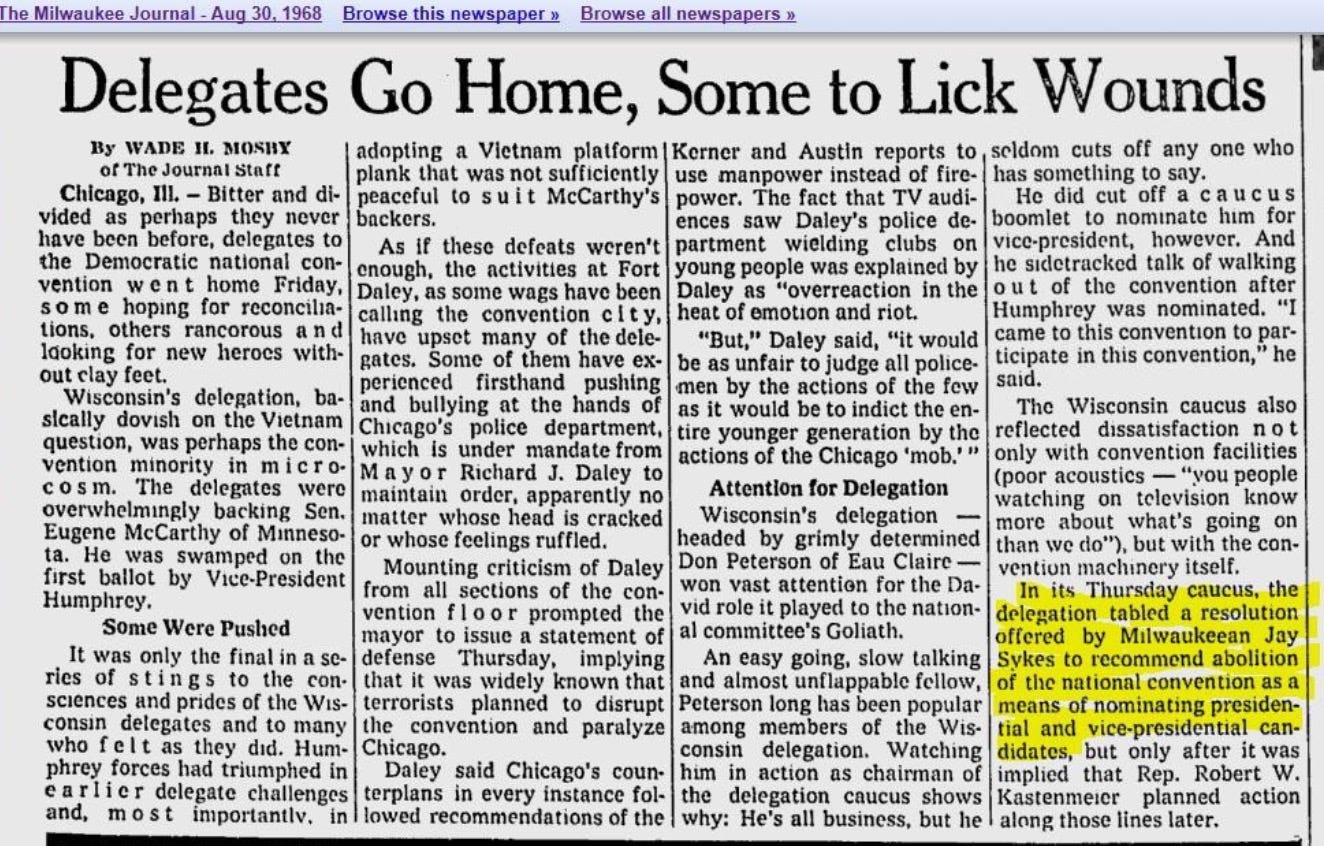
“In its Thursday caucus, the delegation tabled a resolution offered by Milwaukeean Jay Sykes to recommend abolition of the national convention as means of nominating presidential and vice presidential candidates….”
Going through these old pictures and clippings is an odd experience. The convention was 52 years ago, and I was there as a teenager. But as I look at the pictures I find that I can run my finger along the faces of the Wisconsin delegation and name one after another. It's strange how much in your life you can forget, and what things stick with you. For me, 1968 has always felt the central story in the plot, and everything else has been gloss.
Here you can see the Wisconsin banner in the background. On the last day of the convention, I ran across the floor and grabbed it, managing not merely to snag it, but to somehow get it all the way back home. For years it sat in our garage as a personal piece of history. One by one the letters fell off and the cardboard sign disintegrated. It's too late to regret the carelessness on my youth.

Besides the opening of the convention, the other big news today is that the House is returning from vacation to deal with the growing sense that Trump is trying to sabotage the United States Postal Service. The president spent much of the weekend trying to cast doubt on mail-in voting, even as he presides over a growing postal crisis.
“In Ohio, where mail voting is likely to double, piles of undelivered mail are sitting in a Cleveland distribution center. In rural Michigan, diabetes medicine that used to arrive in three days now takes almost two weeks.”
Democrats appear to sense a political opening. Obama insider David Plouffe laid out an aggressive battle plan:
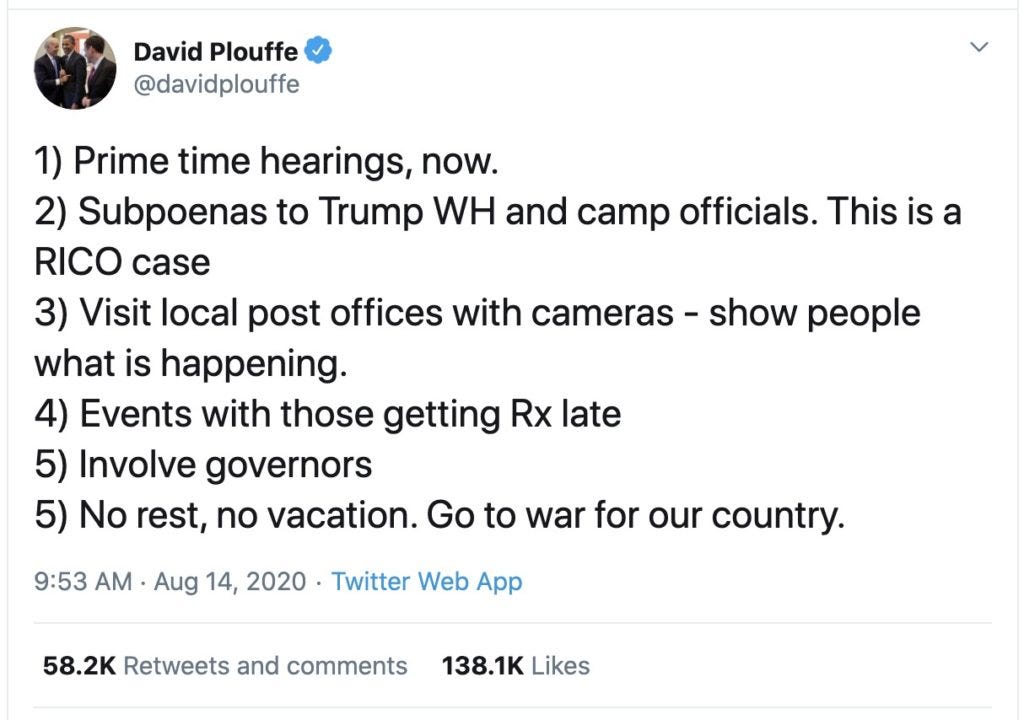
Bill Kristol has this Twitter thread over the weekend that highlights the potential political potency of the issue:
1. The following email I received suggests both why the Post Office scandal is real and why it could be so devastating politically.
"I am a retired teacher (62 years old and retired because of the pandemic).
"I am at high risk because of high blood pressure and mild cerebral palsy. Consequently, I have arranged for my blood pressure meds to be delivered by USPS so that I don't have to leave my house. The meds are now late.
"I have been on the phone with [insurance company] reps for 2 hours yesterday and 3 hours today. I have arranged to get 5 days worth of meds (for which I will have to pay full price) at a local CVS. (Someone else will need to pick up my meds.)
"However, I am taking a gamble not having meds tonight. I am furious! I am sure there are many others like me. I know there must be thousands of vets who are experiencing the same things as I am. I heard Lt Gen. Honore describe a similar problem on MSNBC with Brian Williams.
"He had to go to Walgreens. I'm trying to avoid getting COVID and I'd like to be alive to be able to vote in the election. I'd like my mail in ballot to arrive safely to my registrar of voters in ___ County. I have called my US Rep and my US Senators. What else can I do?"
I'm kind of out of practice in helping with political campaigns (and some might say I wasn't such a great help to begin with!). But even I can see the Democrats need to hang this around the neck of Donald Trump and the Republican Party--and hang it again, and then again...
This weekend: the U.S. death toll from the coronavirus has topped 170,000, the president is touting a new unproven virus "cure" promoted by Ben Carson and the CEO of MyPillow, and Trump World is celebrating another "boat parade" in Florida.
If you like some white knuckle polling with your coffee this morning, there's this one from CNN that shows a race that's tightened to just 4 points: 50 to 46. But that looks like it might be an outlier.
The new ABC/Wapo poll out a few hours ago has Biden leading "by 54 percent to 43 percent among those who say they are absolutely certain to vote and who also report voting in 2016. A month ago, Biden’s lead of 15 points overall had narrowed to seven points among similarly committed 2016 voters. Biden now also leads by low double-digits among those who say they are following the election most closely."

With 78 days to go, Biden maintains his lead. Harry Enten puts this into context:
Biden's lead has been about as stable as they come. Since the beginning of June, he's been up by around 8 to 10 points. We'll see whether the convention period, that begins tomorrow, alters the race.
For now though, we can say Biden's doing better than any challenger heading into the major party conventions since scientific polling began.
In the 13 previous elections in which an incumbent was running for another term, no challenger has ever been at or above 50% in the polls at this point in the campaign. The closest were Jimmy Carter in 1976 and Thomas Dewey in 1948. Carter was at about 49%, while Dewey came in at between 48% and 49%.
Most challengers were not even near that mark. The average opponent to the incumbent comes in at a mere 38% since 1940. Biden is nearly 15 points higher than that at this time. Even so, folks still think Trump will win. Because this is 2020.
